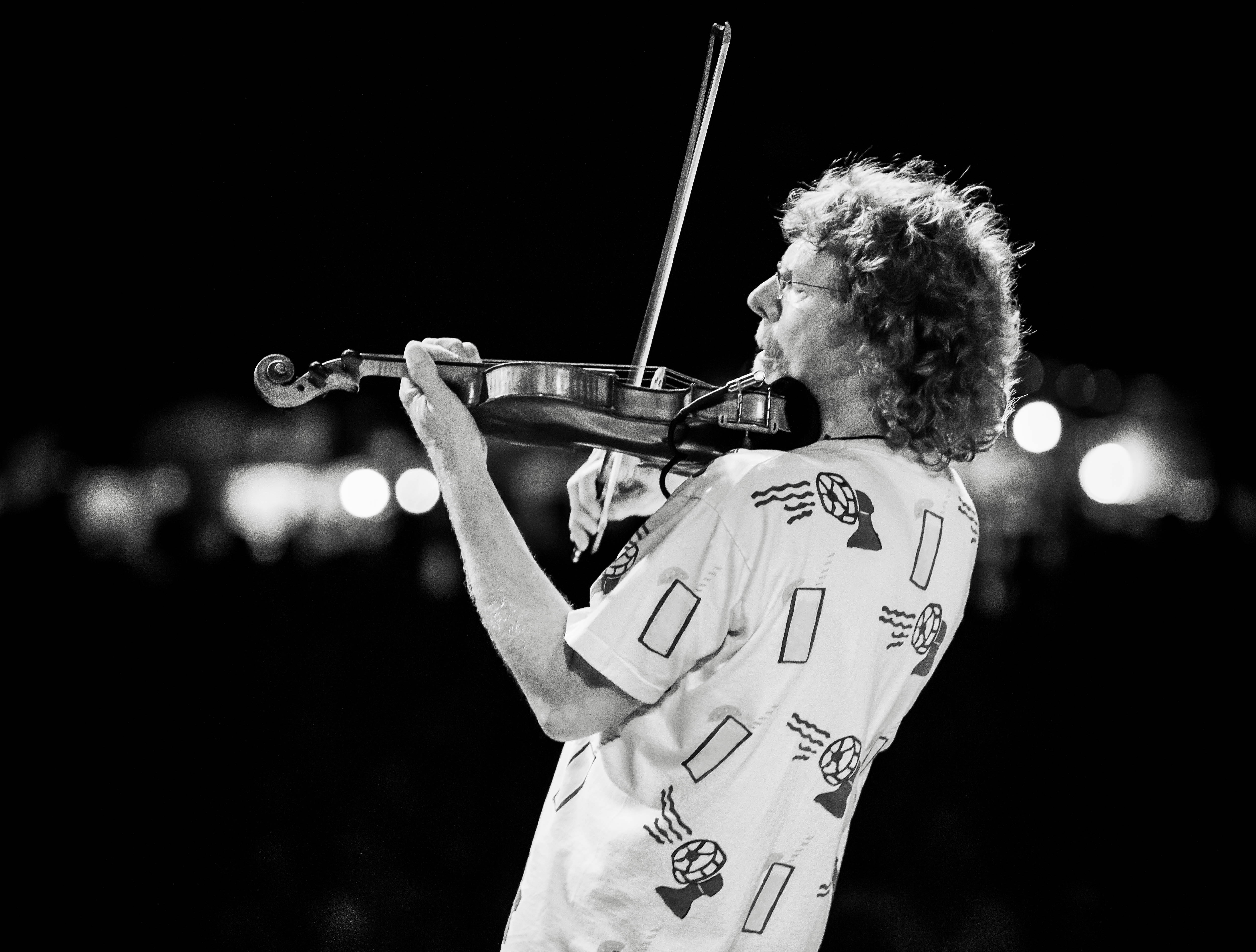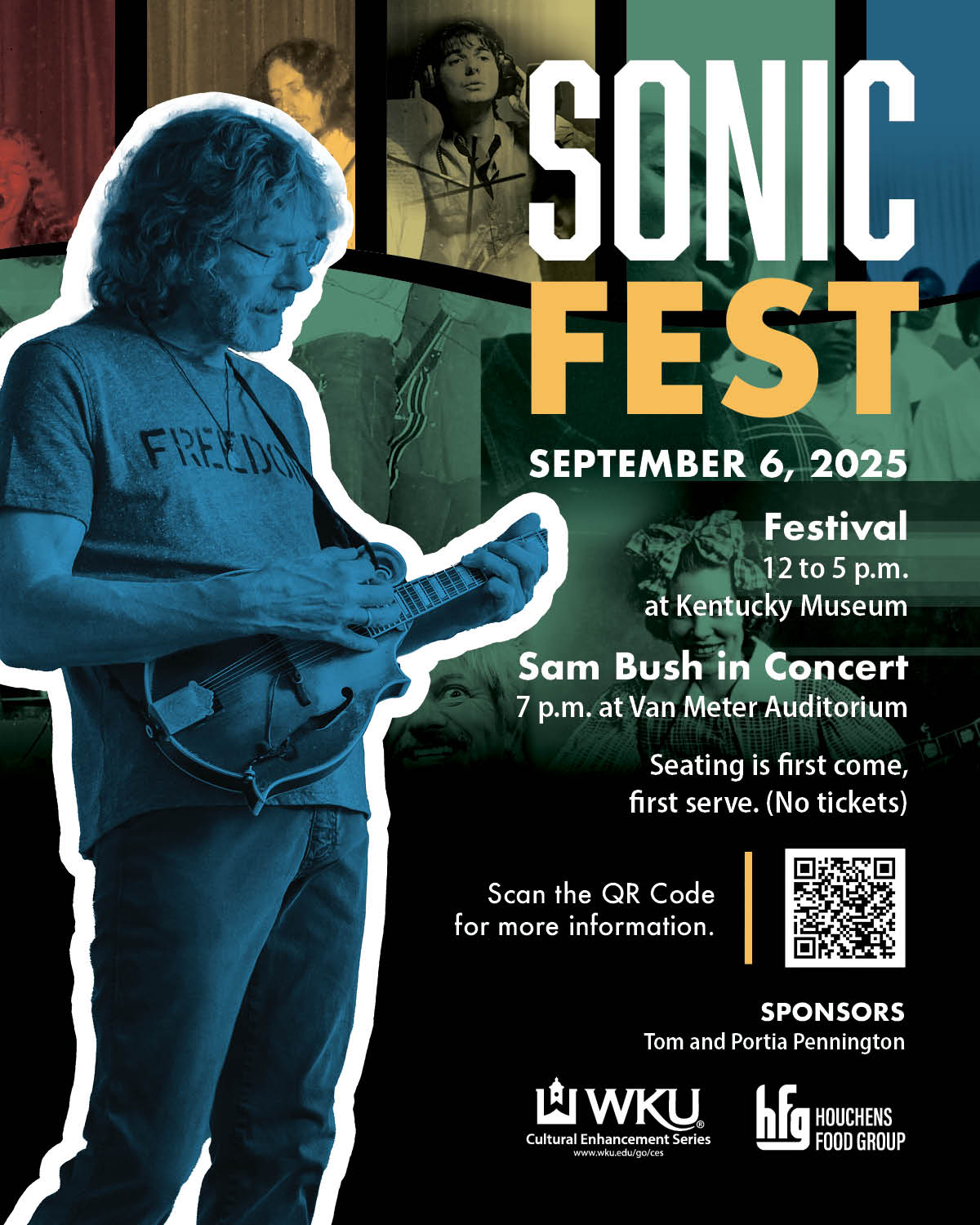Sonic Fest
Saturday, September 6, 2025
Join us for a day-long music festival hosted at the Kentucky Museum! Meet regional musicians, listen to live performances, and celebrate the grand opening of Sonic Landscape: The Musical Legacy of Southcentral Kentucky. Food trucks, art-making activities, and more await. The fun culminates with an evening concert by Sam Bush at Van Meter Hall.
Where: Kentucky Museum at WKU at 1444 Kentucky Street, Bowling Green, KY.
When:
- 12 p.m. to 5 p.m. - Musical performances, art activities, food trucks, and more at the Kentucky Museum!
- Musical performance schedule to be announced.
- 7 p.m. to 8:30 p.m. - Sam Bush in concert at Van Meter Hall
Admission: FREE
Directions and Parking: please click here. All WKU lots will be open for visitor parking!
Full event details are below.
Featured Performer: Sam Bush
 Sponsored by WKU Cultural Enhancement Series and Tom & Portia Pennington
Sponsored by WKU Cultural Enhancement Series and Tom & Portia Pennington
“...one of the premier mandolin players of his generation and a guiding light of the progressive bluegrass scene.” - AMERICANA UK
Born and raised in Bowling Green, Sam Bush's love of music came immediately, encouraged by his parents’ record collection and, particularly, by his father Charlie, a fiddler, who organized local jams. As a teen fiddler, Bush became three-time national champion in the junior division of the National Oldtime Fiddler’s Contest. He recorded an instrumental album, Poor Richard’s Almanac, as a high school senior and in the spring of 1970 attended the Fiddlers Convention in Union Grove, NC. There he heard the New Deal String Band, taking notice of their rock-inspired brand of progressive bluegrass.
In 1971, Bush and his fellow mates formed New Grass Revival. Within just two years, they were touring nationally and transforming the bluegrass genre - and American music. A Kentucky native at heart, and an honorary WKU alum, Bush returns to Van Meter Auditorium on the tenth anniversary of his last concert at the Hill, to once again grace Bowling Green with musical innovation and improvisation.
There was only one prize-winning teenager with gumption enough to say, “thanks, but no thanks” to Roy Acuff. Only one son of Kentucky both finding a light of inspiration from Bill Monroe and his Blue Grass Boys and catching a fire from Bob Marley and The Wailers. Only one progressive hippie allying with like-minded conspirators, rolling out the New Grass revolution, and then leaving the genre’s torch-bearing band behind as it reached its commercial peak.
There is only one consensus pick of peers and predecessors, of the traditionalists, the rebels, and the next gen devotees. Music’s ultimate inside outsider. Or is it outside insider? There is only one Sam Bush.
On a Bowling Green, Kentucky cattle farm in the post-war 1950s, Bush grew up an only son, and with four sisters. His love of music came immediately, encouraged by his parents’ record collection and, particularly, by his father Charlie, a fiddler, who organized local jams. Charlie envisioned his son someday a staff fiddler at the Grand Ole Opry, but a clear day’s signal from Nashville brought to Bush’s television screen a tow-headed boy named Ricky Skaggs playing mandolin with Flatt & Scruggs, and an epiphany for Bush. At 11, he purchased his first mandolin.
As a teen fiddler, Bush was a three-time national champion in the junior division of the National Oldtime Fiddler’s Contest. He recorded an instrumental album, Poor Richard’s Almanac, as a high school senior and in the spring of 1970 attended the Fiddlers Convention in Union Grove, NC. There he heard the New Deal String Band, taking notice of their rock-inspired brand of progressive bluegrass.
Acuff offered him a spot in his band. Bush politely turned down the country titan. It was not the music he wanted to play. He admired the grace of Flatt & Scruggs, loved Bill Monroe - even saw him perform at the Ryman - but he’d discovered electrified alternatives to tradition in the Osborne Brothers and manifest destiny in The Dillards.
“I started working at the Holiday Inn as a busboy,” Bush recalls. “Ebo Walker and Lonnie Peerce came in one night asking if I wanted to come to Louisville and play five nights a week with the Bluegrass Alliance. That was a big, ol’ ‘Hell yes, let’s go.’”
Bush played guitar in the group, then began playing mandolin after recruiting guitarist Tony Rice to the fold. Following a fallout with Peerce in 1971, Bush and his Alliance mates - Walker, Courtney Johnson, and Curtis Burch - formed the New Grass Revival, issuing the band’s debut, New Grass Revival. Walker left soon after, replaced temporarily by Butch Robins, with the quartet solidifying around the arrival of bassist John Cowan.
“There were already people who had deviated from Bill Monroe’s style of bluegrass,” Bush explains. “If anything, we were reviving a newgrass style that had already been started. Our kind of music tended to come from the idea of long jams and rock-&-roll songs.”
Shunned by some traditionalists, New Grass Revival played bluegrass fests slotted in late-night sets for the “long-hairs and hippies.” Quickly becoming a favorite of rock audiences, they garnered the attention of Leon Russell, one of the era’s most popular artists. Russell hired New Grass as his supporting act on a massive tour in 1973 that put the band nightly in front of tens of thousands.
At tour’s end, it was back to headlining six nights a week at an Indiana pizza joint. But, they were resilient, grinding it out on the road. And in 1975 the Revival first played Telluride, Colorado, forming a connection with the region and its fans that has prospered for 45 years.
Bush was the newgrass commando, incorporating a variety of genres into the repertoire. He discovered a sibling similarity with the reggae rhythms of Marley and The Wailers, and, accordingly, developed an ear-turning original style of mandolin playing. The group issued five albums in their first seven years, and in 1979 became Russell’s backing band. By 1981, Johnson and Burch left the group, replaced by banjoist Bela Fleck and guitarist Pat Flynn.
A three-record contract with Capitol Records and a conscious turn to the country market took the Revival to new commercial heights. Bush survived a life-threatening bout with cancer, and returned to the group that’d become more popular than ever. They released chart-climbing singles, made videos, earned Grammy nominations, and, at their zenith, called it quits.
“We were on the verge of getting bigger,” recalls Bush. “Or maybe we’d gone as far as we could. I’d spent 18 years in a four-piece partnership. I needed a break. But, I appreciated the 18 years we had.”
Bush worked the next five years with Emmylou Harris’ Nash Ramblers, then a stint with Lyle Lovett. He took home three-straight IBMA Mandolin Player of the Year awards, 1990-92 (and a fourth in 2007). In 1995 he reunited with Fleck, now a burgeoning superstar, and toured with the Flecktones, reigniting his penchant for improvisation. Then, finally, after a quarter-century of making music with New Grass Revival and collaborating with other bands, Sam Bush went solo.
He’s released seven albums and a live DVD over the past two decades. In 2009, the Americana Music Association awarded Bush the Lifetime Achievement Award for Instrumentalist. Punch Brothers, Steep Canyon Rangers, and Greensky Bluegrass are just a few present-day bluegrass vanguards among so many musicians he’s influenced. His performances are annual highlights of the festival circuit, with Bush’s joyous perennial appearances at the town’s famed bluegrass fest earning him the title, “King of Telluride.”
“With this band I have now I am free to try anything. Looking back at the last 50 years of playing newgrass, with the elements of jazz improvisation and rock&roll, jamming, playing with New Grass Revival, Leon, and Emmylou; it’s a culmination of all of that,” says Bush. “I can unapologetically stand onstage and feel I’m representing those songs well.”
Daytime Festival Performers
Mellow Matt's Music and More is Bowling Green Kentucky's premier independent record store, specializing in new and used vinyl records and CD's. The store's founder and owner is Matt Pfefferkorn, a staple of the Bowling Green music scene since 1980. A WKU alum, Pfefferkorn's first job was at Record Bar, inside Greenwood Mall, and he worked at various record stores before founding Mellow Matt's in 2013. With a special section for local musicians and an emphasis on community, Mellow Matt's is a beloved institution in Bowling Green - and we are excited to have Matt spinning records and showcasing local tunes!
Tommy Johnson - Lead guitar and vocals
Shane Johnson - Guitar and vocals
Graham Hudspeth - Bass, Irish bazouki, and vocals
Phillip Montgomery - Steel guitar andvocals
Webb Hendrix - Percussion
The Songfarmers are a roots/Americana group from the Bowling Green, Ky area. They play primarily original music written by Tommy Johnson. Shane Johnson and Graham Hudspeth also contribute of their original songs. They have one CD titled Bonafied, which Jack Montgomery called "a melodic mix of contemporary music called Americana which musically blends modern folk, bluegrass and country into an infectious and delightful cornucopia that has worldwide appeal."
Jonell began singing at a young age, inspired by her mother’s love of jazz and Big Bands. She was particularly drawn to male voices, like Otis Redding, James Taylor, Jackson Browne, and Dan Fogelberg. She eventually performed jazz in Louisville piano bars.
Jonell moved from Louisville to Bowling Green to attend WKU, where she met Texas singer-songwriter Townes Van Zandt in 1978 or 1979. She started playing with local musicians, then playing full-time with the Ken Smith Band at venues such as the Golden Branding Iron, Michael’s Pub, the Iron Skillet, and Picasso’s. She also played in the band Yo’ Mamma, with Anne Meyers, Kathy Stamps, and Kathy Mac.
In 1996, Jonell released her debut album, a compilation of Townes covers called Around Townes. This brought her to the attention of Bonnie Raitt producer Don Was, who put a band together with Jonell as the lead singer; members included guitarist Mark Goldenberg, keyboardist Benmont Tench, and drummer Ringo Starr. Named the New Maroons, they recorded seven songs and played two gigs before the project was shelved. Jonell then signed with MCA and began recording in Nashville and Los Angeles. Her version of “Stop in the Name of Love” was used in the 1998 film, Hope Floats.
Jonell continued to record and publish records in the 2000s, in between raising her sons. She also became part of the Freedom Singers, who perform songs that were once banned or censored.
Eddie Pennington is a native of Nortonville, Kentucky, who was inspired by his father - a coal miner and fiddle player who exposed him to songs about the hard life of miners. Pennington began playing guitar at age 11, and devoted himself to the thumb-picking style after hearing Merle Travis play. He learned the style from Mose Rager, and continued developing his talent - playing both acoustic and arch-top electric guitars - while making a living as a funeral director and county coroner. Pennington is a two-time national champion and a recipient of the National Heritage Award, the nation’s highest honor bestowed upon traditional artists by the Library of Congress.
Eddie's son, Alonzo "Zo" Pennington, began playing at the age of 7. Learning from his father and the 2-20 guitarists often found in the Pennington house, Alonzo became a natural performer. At age 13, he discovered Jimi Hendrix and Stevie Ray Vaughn and, as he said, "the blues took ahold of me." From then on, Alonzo pursued a blend of thumpicking and blues, playing guitar, fiddle, and mandolin alongside his father and other musicians, at venues from country bars to the Grand Ole Opry, and becoming a semi-finalist in the International Blues Challenge.
Caleb Coots, grandson of Eddie Pennington, is based in Bowling Green. He began playing fiddle and drums at age 5, and guitar at age 10, learning from his grandfather. He is a national and international thumbpicking champion, and has been inducted into the National Thumbpickers Hall of Fame - all before reaching the age of 20.
Michael Gough learned to play music from his mother and formed his own badn in middle school. He played his first professional gig at age 19, eventually playing with Robert Phillips, Jeff Smith, Alonzo Pennington, and Tommy Johnson as a blues musician. He has also played Blues competitions in the area. He takes inspiration from the musicians around him and the history of the music in the region.
John Martin earned degrees from Western Kentucky University and Austin Peay State University. He is currently director of guitar and music technology studies at Western Kentucky university in Bowling Green Kentucky. He has appeared in Guitar Player magazine, and has made concert appearances with artists such as Al Martino, Norm Crosby, Tinsley Ellis, Clint Holmes and Red Buttons. Along with teaching at Western, he is currently very busy as a freelance musician for several groups including his own jazz trio. The John Martin Trio's first CD was released in November of 2002.
Songwriter and recording artist Bill Lloyd grew up in Bowling Green with parents who were both musically inclined and encouraged that. Inspired by both a pianist mother and semi-pro drummer father, Bill was also influenced, like many his age, by the pop culture of the times including local radio stations of varied formats. He began writing songs and forming bands as early as grade school.
Known primarily as a drummer in local bands, he also began playing solo with guitar in local restaurants and bars. Along with fellow songwriter, David Surface, his earliest recordings were with bands that wrote their own material and played regionally: Southern Star in the mid-1970s and a few years later, Sgt. Arms, which included Marc Owens and Ernest Raymer. In 1982, Bill moved to Nashville, but he also kept his Bowling Green bandmates close and played with them often. He signed a publishing deal in 1985 with Mary Tyler Moore’s MTM and a solo record in 1986 on the independent label Throbbing Lobster out of Boston. Writing partnerships with Radney Foster and Beth Nielsen Chapman were forged in those MTM years that proved to last far beyond.
In 1986, Bill and songwriting friend Radney Foster were signed to RCA Records, and the band they put together was composed of his long-time Bowling Green musician friends, including Marc Owens, Byron House, and Kyle Frederick. Foster and Lloyd had nine charting singles over three albums in the next four years including their first single that went to number one. They appeared regularly on the CMA Awards and travelled internationally. In addition to his performing work in bands such as The Sky Kings, his songwriting credits included other nationally notable artists such as Trisha Yearwood, Martina McBride, Sara Evans, Hootie and the Blowfish, Poco, New Grass Revival and Cheap Trick. Since 2004, The Long Players, a band he put together of Nashville area players, have taken classic albums and performed them live and in sequence to sell out crowds.
Kyle Frederick has spent decades working on the creative and business sides of the music industry. Growing up in Kentucky, Frederick began playing guitar at the age of seven. He started working as a professional musician in his early teens, and played lead guitar in a popular regional rock act.
When the band broke up, Frederick headed to Nashville, landing gigs with artists such as Joe Sun, Earl Thomas Conley and Foster & Lloyd. His recorded work with Sun and Conley found him playing beside legends like Randy Scruggs, Steve Scruggs and Jim Horn. National television appearances included “The Tonight Show,” “CBS This Morning,” “Nashville Now,” “Hee Haw” and four episodes of “Austin City Limits.”
Frederick recorded “In This House,” a solo album of originals produced by Byron House, in 1991. He toured with a major country act before moving into management, handling multi-platinum artists and their associated charities. He also worked in public relations, aiding Liz Thiels impressive efforts supporting the grand opening of the new Country Music Hall of Fame in 2001. But making music was never far from his mind, and he continued to write songs.
Frederick returned to recording in 2008. In 2012, he signed a publishing and production partnership deal with Doug Howard, owner and president of Vandermont Music Group. The rootsy “Eventide” reunited Kyle with Byron House, who recorded and co-produced. An impressive list of guest appearances included Emmylou Harris, John Cowan, Gordon Kennedy and Kim Richey. Frederick’s successful production partnership with House continues to this day.
Emcees
Chris Carmichael is a musician and arranger born in 1962 in San Antonio, Texas, who settled in Bowling Green, KY in 1975 after his father retired from the Air Force. He attended WKU, studying violin with professor Betty Pease and music theory, composition, and performance under Dr. David Livingston, Vsevolod Lezhnev, and Leon Gregorian. After years of touring with artists across various genres, his own group, Fifteen Strings, landed a major record deal with Atlantic Records, in New York. In the early 90’s he worked as a staff songwriter for Warner/Chappell publishing before transitioning to full-time studio work and arranging, eventually working solely from his own studio in Bowling Green. Since that time, his work has appeared on recordings for Taylor Swift, Buddy Guy, Sheryl Crow, Norah Jones and Steve Earle, to name a few.
Dr. Erika Brady is a WKU Professor Emeritus in Folk Studies and co-host of the radio show Barren River Breakdown. A graduate of Harvard, UCLA, and IU-Bloomington, Brady taught at WKU from 1989 to 2022, with a focus on American roots music and health belief systems. Her many accomplishments included serving eight years as editor of Southern Folklore, assisting the Library of Congress with preserving its collection of wax cylinder recordings, and numerous publications and speaking engagements. Notably, she received the 2011 Kentucky Governor's Award for hte Arts for her work bringing regional music to Kentucky through Barren River Breakdown and her research has been instrumental to tracing the roots of Kentucky's bluegrass traditions.
Special Thanks to
Max Erskine of Erskine Sound and Jeffrey "Smitty" Smith.
The Kentucky Museum and Kentucky Folklife Program teams.
Art Activities
The Oracle Arts Council will be hosting music-inspired arts activities that celebrate how arts, crafts, and music intersect. Activities include friendship bracelets and make-your-own backstage passes.
The Oracle Arts Council is is an arts non-profit based in South Central Kentucky, formed to educate, entertain, and inspire. Connect with them here and be sure to visit their Enchanted Emporium on September 28 at The Grove in Glasgow, KY.
Food Trucks
 |
 |
 |
Wait - there's more! The Kentucky Museum will host an entire year of programs focused on Sonic Landscape and celebrating our musical heritage. Learn more on our America250 page.
Sponsored by

and
Tom and Portia Pennington
Additional support provided by

and
WKU's Research and Creative Activity Program
Some of the links on this page may require additional software to view.


